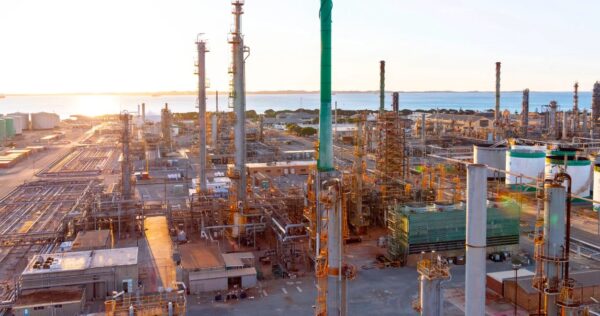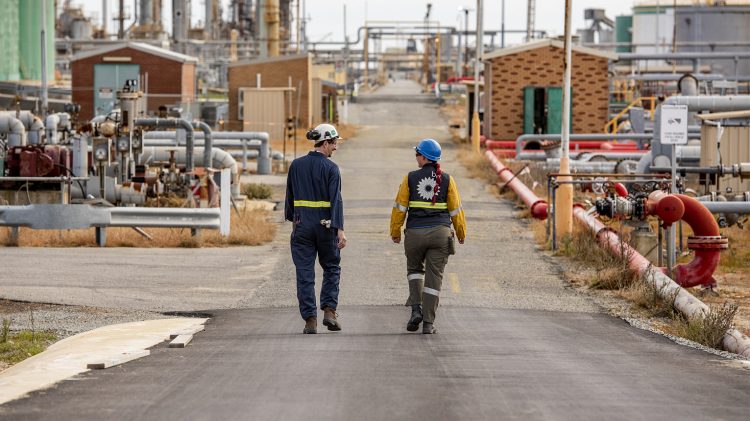Energy giant bp’s plans to produce green hydrogen at its Kwinana Energy Hub in Western Australia have reached a major milestone with the company’s H2Kwinana project entering front-end engineering and design (FEED).
The company said the H2Kwinana project, supported by $70 million (USD 45 million) from the Australian government as part of its Regional Hydrogen Hubs program, is to include a 100 MW electrolyser, with the potential to expand to a total of 1.5 GW production in subsequent phases.
The project also involves the installation of hydrogen storage, compression and truck loading facilities and upgrades to bp’s existing on-site hydrogen pipeline system.
When operational, the facility could produce more than 14,000 tonnes of green hydrogen per annum for industrial use and heavy transport.
Site works for H2Kwinana are already underway, with construction proper to start in 2026 with the project expected to be delivered by mid-2027.
The project is part of bp’s plans to transition the site near Fremantle, which has been serving as an import terminal since the oil refinery shut in 2021, into an energy hub to produce green hydrogen and other renewable fuels, including renewable diesel and aviation fuel.
Lucy Nation, bp’s vice president of hydrogen in Australia and the Asia Pacific, said the project will leverage existing infrastructure with the hydrogen produced from water and renewable power having the potential to decarbonise the planned biorefinery where hydrogen is to be made from natural gas and biogas.
“We are repurposing existing process units, tanks, pipelines and utilities from the former refinery as the starting point for Kwinana Renewable Fuels and H2Kwinana,” Nation said.
“Both of these projects will allow us to supply ourselves and our customers with products that allow them to meet their own emissions targets while also contributing to Australia’s decarbonisation targets.”

Image: bp
The H2Kwinana project is part of a growing pipeline of green energy projects bp is pursuing in Western Australia.
Earlier this year bp announced it had secured land for a proposed 10 GW wind and solar generation project that would be used to power an export-scale green hydrogen and ammonia production facility in the state’s mid-west.
The company has also acquired a stake in the 26 GW Asian Renewable Energy Hub (AREH) project planned for Western Australia’s Pilbara region.
“We are all-in in Australia, with major investment plans in WA and specifically in the Kwinana area,” bp Australia President Frédéric Baudry said.
“H2K at Kwinana is bp’s strategy in action, leading from the front in decarbonisation in the region and providing energy security through diversity.”
The H2Kwinana project has attracted support from the state and federal governments with Australian Energy Minister Chris Bowen announcing a $70 million investment as part of its Regional Hydrogen Hubs program.
Bowen said Australia’s hydrogen industry is projected to generate $50 billion in additional gross domestic product by 2050, creating tens of thousands of jobs in regional Australia as Australia transforms to a renewable energy superpower.
“Investing in an Australian hydrogen industry is investing in Australia’s future,” he said.
“Kwinana has been an industrial and economic powerhouse for decades, making it an ideal location for a hydrogen hub that can support decarbonisation of heavy industry and connect our renewable resources to the world.”
The Australian government is investing more than $500 million in regional hydrogen hubs, including in Gladstone, Townsville, the Hunter, Bell Bay, Pilbara and Port Bonython.
This content is protected by copyright and may not be reused. If you want to cooperate with us and would like to reuse some of our content, please contact: editors@pv-magazine.com.









2 comments
By submitting this form you agree to pv magazine using your data for the purposes of publishing your comment.
Your personal data will only be disclosed or otherwise transmitted to third parties for the purposes of spam filtering or if this is necessary for technical maintenance of the website. Any other transfer to third parties will not take place unless this is justified on the basis of applicable data protection regulations or if pv magazine is legally obliged to do so.
You may revoke this consent at any time with effect for the future, in which case your personal data will be deleted immediately. Otherwise, your data will be deleted if pv magazine has processed your request or the purpose of data storage is fulfilled.
Further information on data privacy can be found in our Data Protection Policy.